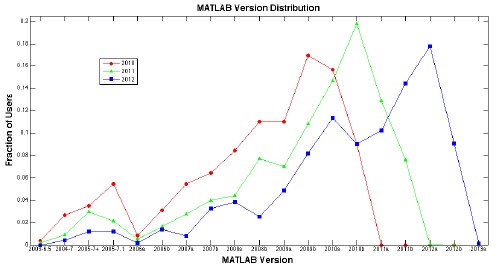MATLAB Version Distribution
Jan 24, 2013
One of the challenges of writing software that works with MATLAB is accommodating an array of versions. For better or worse, not everybody updates their MATLAB regularly. So we have to make our PLS_Toolbox and other toolboxes work with a fairly wide distribution of MATLABs.
To give you some idea of what our developers are up against, the plot below shows the distribution of MATLAB versions among our users for each of the last three years. (Click on the plot to get a much larger .pdf version.)
While the most common version in use at any one time tends to be one of the latest two or three releases, it never peaks at more than 20% of our users. And there are LOTS of users with older versions of MATLAB. Note that the plot goes back ten years to 2003! In 2010, we still had 12% of our users with MATLAB versions from 2005 or earlier. It was only after that dropped to less than 5% that we stopped supporting MATLAB 6.5 and 7.0.1 in our new releases. As shown in our release notes, we currently support MATLAB 7.0.4 (from early 2005) through the current MATLAB 8.0 (R2012b). And with our latest minor update (PLS_Toolbox 7.0.3) we’re ready for R2013a, so you’ll be set when it comes out.
But it is a balancing act. We don’t want to force users to upgrade their MATLAB. We understand that an older version of MATLAB works perfectly well for many users. But often we can’t take advantage of newer MATLAB features until we cut old versions loose. As an example, it would be much easier for our developers to use the newer format for coding objects (such as our DataSet Object) that became available in MATLAB 2008a. Until recently, however, 10% of our users were still working with MATLAB 2007b or older.
Our Chief of Technology Development Jeremy M. Shaver notes: Moving users to later versions of MATLAB allows us to utilize better graphical interface tools (making our interfaces easier to use and more powerful), modern hardware architecture (allowing faster processing and better memory management), and other new programming functionality (making the code easier for us to support and for our power-users to understand). Plus, having fewer MATLAB versions to support means we have fewer “special cases” to support in the code. We balance this against our user’s inconvenience and cost in order to achieve the best overall result for our customers!
Well said, Jeremy!
BMW

 SEARCH
SEARCH